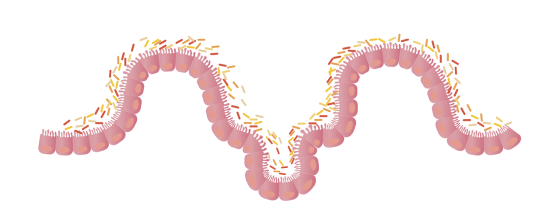Our gut is home to tens of trillions of micro-organisms, our microbiome. This amazing population of bugs has many functions that are essential to our health and wellbeing, including digestion and nutrient absorption, immune system regulation, metabolism and mood. Dysbiosis, an imbalance in our gut bug community, is an important contributor to inflammation and the breakdown of our gut barrier.
The gut is lined with a barrier that maintains a balance between our internal and external environments, and forms an important part of our immune system. 70% of our immune system resides in our gut, waiting to diligently dispose of any invader that we may happen to ingest. The gut lining is composed of cells joined together with gates called tight junctions. When triggered, the gates open to absorb good things like nutrients, and close to keep toxins and bad bugs out.
Many factors including antibiotics, a poor diet, parasites or an unbalanced microbiome can lead to the break down of the tight junctions; the gates get stuck open, resulting in a leaky gut. A leaky gut starts to let gut bacteria and large food molecules into the bloodstream. The immune tissue in our gut becomes overloaded and over-reactive, and starts to begin attacking our own cells.
Autoimmune diseases such as Hashimoto’s hypothyroid, endometriosis, rheumatoid arthritis and Type 1 diabetes essentially develop in the same way, it’s just the target of the disease that differs – your thyroid, uterus, joints or pancreas. A leaky gut and dysbiosis are important triggers in the development of autoimmune disease in people with a genetic susceptibility.
Inflammation in our body also increases as a result of a leaky gut, and increased intestinal permeability may be a significant contributor to many common chronic illnesses including allergies, arthritis, chronic fatigue and anxiety and depression.
How Can I Heal my Leaky Gut?
Most of us have a leaky gut and dysbiosis to some extent. By improving the diversity of our gut bacteria and healing the damage, you can reverse or minimize the negative impacts of leaky gut. Reducing or avoiding antibiotics, making some dietary changes, adding nutrients and probiotics and managing our stress all have positive impacts on our microbiome.
Minimise Antibiotics
Antibiotics are essential, life saving medications. However in the process of killing off infection causing micro-organisms, they also destroy beneficial gut bacteria, disrupting the delicate balance in our gastro-intestinal system. Protect your microbiome by minimising the use of antibiotics where possible.
Diet and Supplements
Our gut bugs feed on the fibre in our food, so eating a wide range of fibrous foods is the best way to ensure a healthy microbiome. Gut bugs particularly love prebiotics, including sweet potato, lentils, leek, garlic and pumpkin. Include good quality protein and lots of colourful fruit and veg and you’ll be providing your gut with the essential nutrients and antioxidants it needs.
Supplementing with probiotics and zinc are important for healing leaky gut, by increasing our bacterial diversity and promoting the repair of the intestinal barrier.
Ditch Gluten
Gluten, a protein in wheat and some other grains, is another known trigger of leaky gut. When we eat gluten, our body releases zonulin, and molecule that breaks the tight junctions between the cells in our gut lining. Gluten and other proteins in wheat can also cause inflammation, which may cause the joint pain, headaches and fatigue that some people feel when they eat gluten containing foods.
Manage your Stress
The gut and brain are intimately linked and are constantly sending signals to each other. Stress, depression and anxiety can affect the contractions of the muscles in your gut, as well as increasing inflammation and pain. Patients with gut imbalances may recall that their symptoms began after a stressful event, or find their symptoms worsen with stress. Mindfulness, abdominal breathing or other stress management techniques are an important part of supporting optimal gut health.
Moderate Exercise
Movement and exercise offer a whole range of positive health effects including stress management, bone strength and decreasing the risk of developing chronic disease. Exercise is also thought to benefit the gut directly, by increasing the integrity of the gut membranes, supporting bacterial diversity and reducing inflammation.
Heal your Gut with Acupuncture and Chinese Medicine
Acupuncture can promote gut healing by reducing inflammation and calming the immune response. By balancing the part of the nervous system that controls digestion and healing, acupuncture can help to normalise gut function and support a diverse, healthy microbiome. Chinese medicine can also form part of your stress management routine, restoring calm and relaxation to your day and building resilience to stress.
